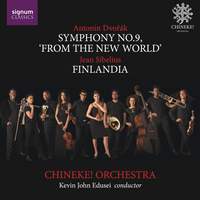Interview,
Chi-chi Nwanoku on Chineke!'s debut recording
 Last month saw the release of an exciting new recording of Dvořák and Sibelius - the debut album from Chineke!, a British orchestra set up to provide an opportunity and platform for majority BME (black and minority ethnic) orchestral musicians.
Last month saw the release of an exciting new recording of Dvořák and Sibelius - the debut album from Chineke!, a British orchestra set up to provide an opportunity and platform for majority BME (black and minority ethnic) orchestral musicians.
The main work on the disc is Dvořák's ever-popular 'New World' symphony, which incorporates elements of Native American and African-American music - the latter reaching Dvořák's ears via his student Henry T Burleigh, a prolific collector and arranger of spirituals and folk music.
Chineke! is the brainchild of double-bass player Chi-chi Nwanoku OBE (orchestral principal, soloist, frequently-recorded chamber musician and Fellow of the Royal Academy of Music and Trinity Laban Conservatoire of Music and Dance) - who was kind enough to offer some of her thoughts on this new disc.
You’ve clearly put a lot of yourself into this project. Can you tell us a bit about how you initially started putting Chineke! together? What sort of challenges did you face in getting the orchestra off the ground?
When it came to setting up Chineke!, it was a huge learning curve for me. Artistically and organisationally, I had - and still have - great ambitions for what Chineke! could be. The challenge for me was in making those ambitions a reality with very limited resources. I have had to learn a great deal of new skills in the past two years: managing staff, fundraising, public relations...the list is endless!
By and large, I have managed to meet many of my goals, but over a longer timescale than I had originally expected. In the first two years of Chineke!’s life, we had only two major concerts: one each year. This year, we have more than a dozen! Those who do support us tend to buy into the vision of Chineke!, and so there is not so much artistic conflict there.
I know certain stakeholders, particularly the government and the Arts Council, are looking to see us build up the structure of the organisation, to ensure there is a support structure upon which the work of Chineke! can be built. At the moment, we run on a staff of four, all of us nominally part-time (although sometimes it seems as though I work eight days a week!), so I very much agree with this. However, it is even more challenging to get funding for structure and management than for the orchestras themselves or for educational work!
The programme notes by Fin Conway suggest that the extent of African and Native-American influence on Dvořák’s 'New World' Symphony has been downplayed by subsequent scholarship. Do you agree?
It is certainly possible to enjoy a wonderful piece of music in its own right. However, I do think knowledge of the work, its structure and background, can enhance your enjoyment of the piece. Why else would we listen to the same works over and over again? Each time we listen, our increased knowledge of and familiarity with these works allow us to get past the surface detail and gain some new insight.
There is a certain strain in musical scholarship that regards the composer’s own words as secondary to whatever theoretical points the academic is trying to make. I am a firm believer that when the composer says their work represents something or is influenced by something, then it is! Dvořák very clearly stated the importance of African-American spirituals and Native-American music to the 'New World' Symphony, and so we need to recognise that and take him at his word.
The USA has a very different relationship with race and ethnicity than we do. In many ways, they are far ahead of us, and groups such as the Sphinx Organisation and Gateways have been doing for decades what Chineke! has just started doing in the UK. In other ways, their more recent history of slavery and segregation mean that sometimes, common sense loses out to politics in academia. We see it in the sciences, with climate change denial, and we see it in musicology, with these kinds of dismissals of the influence of Black & minority ethnic (BME) musicians and their traditional music on the larger classical canon.
Henry T Burleigh is today mostly known – if he is known at all – as the arranger of numerous spirituals into what we might call a Western classical style. Do you feel his role in the creation of arguably Dvořák’s most famous work has been overlooked?
Absolutely. Burleigh’s relationship with Dvořák was the defining reason why the African-American musical idiom ended up in the 'New World' Symphony. For those who do not know, Burleigh was a student at the National Conservatory of Music in New York during Dvořák’s term there as director. Dvořák was fascinated by Burleigh’s repertoire of spirituals, and frequently requested private performances of these songs. This was all during the period in which the New World Symphony was being written. That Dvořák subsequently incorporated these melodies into the new work, and publicly stated that such spirituals should be the basis for a new school of American composition, is no coincidence.
At the turn of the nineteenth century there were of course plenty of people who were quite happy to use Native American and African 'flavours' in what today seems a rather superficial, almost gimmicky way. Coleridge-Taylor’s 'Hiawatha' trilogy, in particular, has not aged well. Do you think Dvořák is guilty of the same thing in his symphony, or is his engagement with non-European styles on a deeper level?
I think the proof is in the fact that the 'New World' Symphony remains, as you say, Dvořák’s most famous work! Compositions of this sort which have not aged well, like the 'Hiawatha' trilogy, tend to focus on surface detail rather than harmony or form. The result is a work filled with the ‘characteristic’ features of traditional music, be it instrumentation, ornamentation, or other ‘gimmicks’.
What Dvořák’s work does is take the underlying structure, as he saw it, of African-American spirituals and Native American dances - that is, the pentatonic scales and melodic structures - and place them within an entirely Western Classical context. I think that is why the work was well received in its own time, and why it has remained popular up to the present day.
Sibelius’s stirring Finlandia is famous for being a vigorous statement of Finnish national identity in the face of Russian imperialism, but its link to Africa via its use as the national anthem of Biafra is maybe less well known. Did you have this connection in mind when including it on this album?
Very much so. My father and his family are from the Igbo region in what is currently south-eastern Nigeria. When that region and its people declared independence and set up the state of Biafra in 1967, they adopted the Finlandia hymn as their national anthem. Growing up in the UK, this was one of the earliest pieces of classical music I was exposed to, although I believed it to be the Biafran national anthem first and foremost. In fact, when I first heard Finlandia played in full, I thought Sibelius had pinched the anthem for his own piece! It was only later that I realised the music for the anthem had been borrowed from Finlandia and not the other way around!
Having reached the major milestone of having your first album released, what are your future plans for Chineke! ? As the programme notes mention, there are plenty of neglected black composers from Europe’s past who you’ve already shed some light on in documentaries; would this be something you’d want to explore on disc as well?
That would be wonderful! At the moment, we are very much tied to recording whatever we are performing, as we could not support the cost of bringing together the orchestra for a recording alone. However, in the future I would love to record the complete works of Joseph Boulogne, Le Chevalier de Saint Georges. Boulogne was not only a violinist and composer; he was a phenomenon! The finest fencer on the continent, a champion boxer and a close personal friend of the Prince of Wales, he was the colonel of his own legion fighting for the new French Republic. US president John Adams also described him as ‘the most accomplished man in Europe’! But of particular poignance to me was that he had achieved all of these things as a free black man living in an age of slavery: the son of a French aristocrat and a Senegalese slave, he was even referred to as ‘The Black Mozart’. He was also a pioneer abolitionist and arguably the most famous black figure of his era.
History is littered with BME musicians and composers whose achievements, if not quite as exceptional as Boulogne’s, certainly deserve to be revived and celebrated. In addition to this, there are many contemporary BME British composers, such as Errollyn Wallen, Eleanor Alberga, Daniel Kidane, Hannah Kendall and James B Wilson whose work needs to be more widely heard. Their music deserves to be published and recorded, and that is something we definitely intend to do.
Chineke!'s debut recording was released on Signum on 7th July.
Available Formats: CD, MP3, FLAC, Hi-Res FLAC



